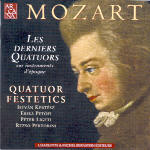This set comprises the “Hoffmeister” quartet (written following the six “Haydn” quartets), and the three “Prussian” quartets–works that caused Mozart considerable struggle. He spoke of the “exhausting labor” of completing them, and there is some evidence of this in the hard-wrought feel of the last two quartets. Mozart’s writing takes on a weight and tone that would not be out of place in Beethoven’s early, or even middle period masterpieces in the genre. Of particular note is K 590, which begins with a big first movement (repeat observed) that uses all of its 15 minutes to fully flesh out its argument. The remaining movements are also of “romantic” dimensions, but are not dull because of this: in fact, they hold our attention quite well. However, they do not excite the way, for example, Haydn’s Op. 76 quartets do. But Mozart is in a deeper, more reflective mood than Haydn, and seems to have little inclination for fun and games, even though all four quartets are in major keys and have dancing minuets. The Festetics Quartet matches Mozart’s earnestness with its own authoritative involvement, playing with considerable devotion and seriousness of purpose. The sound of their original instruments is thin and whiny, though the ear eventually (almost) adjusts. Arcana’s bright recording doesn’t help, but still allows sufficient bass to come through.
































